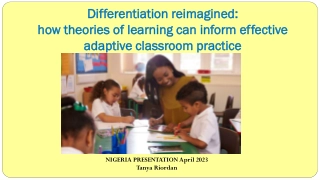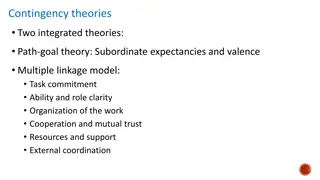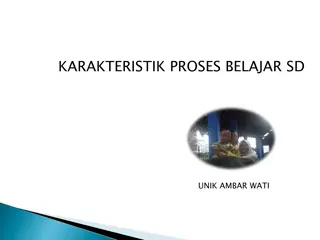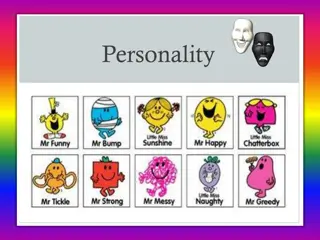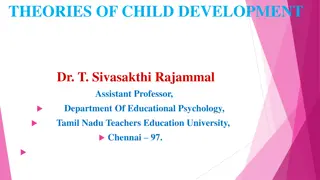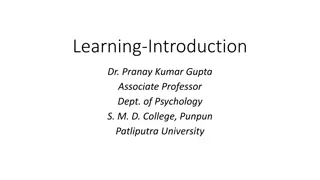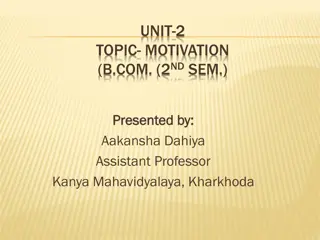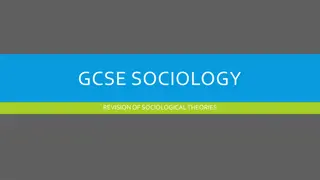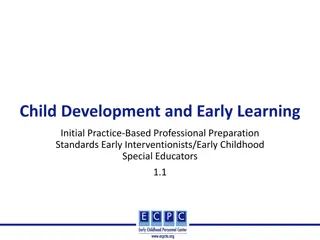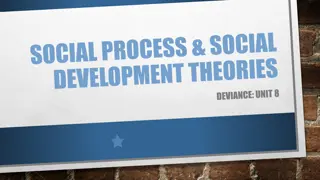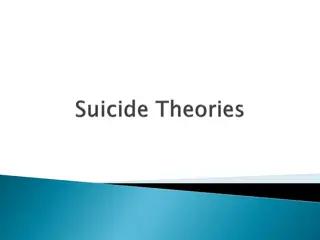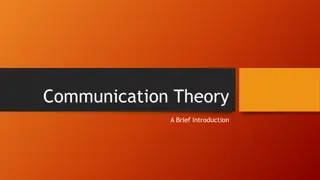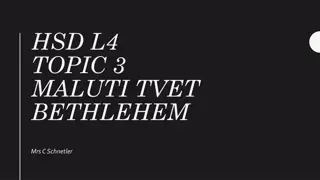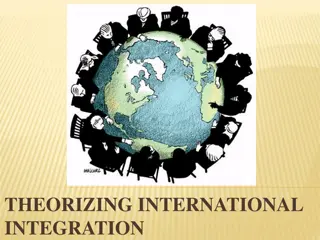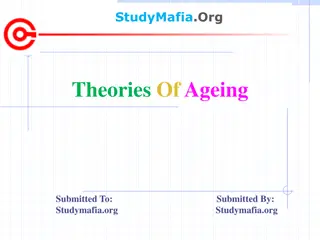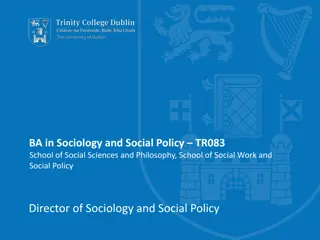Exploring Learning Theories and Nudging Theory in Educational Technology
Today's session at the University of Washington delves into popular learning theories influencing educational technology development, implementation, and evaluation. Dr. Taylor's work focuses on digitally mediated intergenerational learning, while the Educational Software Development Cycle underscor
6 views • 20 slides
Reimagining Differentiation: Enhancing Classroom Practice Through Learning Theories
Explore how theories of learning can inform effective adaptive classroom practice, focusing on the concept of differentiation. The presentation delves into reimagining differentiation, key theories supporting it, and practical strategies to support differentiation in language classrooms. The researc
0 views • 35 slides
Leadership Theories and Power Dynamics in Organizations
Explore contingency theories, dyadic theories, power and influence concepts, and leadership lessons from "12 Angry Men". Dive into the significance of leader-member exchange (LMX), political skills, and the interplay between power, politics, and organizational efficiency.
0 views • 27 slides
Theories Explaining Deviant Sexual Behavior Throughout History
Explore historical theories on deviant sexual behavior, including demonological, anomie, psychoanalytical, human ecology, and somatotyping theories. These theories range from supernatural beliefs of possession to scientific interpretations of societal influences and individual characteristics.
2 views • 33 slides
Testing Extended Theories of Gravity Using Black Hole Shadows
Exploring the shadows of black holes as a method to test extended theories of gravity, this study discusses the existence of black holes, gravitational wave astronomy, and direct imaging. Researchers Oleg Zenin, Stanislav Alexeyev, Alexandra Nemtinova, and Artem Baiderin present findings on black ho
5 views • 18 slides
Characteristics of Elementary School Learning Process and Theories
This presentation covers the unique characteristics of the elementary school learning process, theories of learning including discipline mental, association, insight, and Gestalt, as well as aspects such as signal learning, motor skills, cognitive strategies, and intelligence aspects. It also discus
5 views • 17 slides
Insights into Theories of Motivation and Their Application
Motivation, a driving force behind human behavior, is explored through various theories like Maslow's hierarchy of needs, McClelland's learned needs theory, and others. Understanding these theories can help organizations enhance worker productivity by addressing different motivational factors.
8 views • 21 slides
Understanding Personality: Theories, Types, and Assessment
Exploring the intricate world of personality, this comprehensive guide delves into major theories of personality development, assessment methods, cultural influences, and key contributors. Discover the different types of personalities, including Type A and Type B, and unravel the complexities of psy
0 views • 96 slides
Understanding Theories of Child Development by Dr. T. Sivasakthi Rajammal
Child development theories such as Erikson's psycho-social theory, Piaget's cognitive development theory, and Kohlberg's moral development theory explain how children grow and change across different stages of childhood. These theories focus on various aspects of development including social, emotio
0 views • 27 slides
Psychological Theories of Criminality: Understanding the Roots
Psychological theories of criminality delve into the association between intelligence, personality, learning, and criminal behavior. Major theories include Psychodynamic Theory by Freud, Behavioral Theory by Bandura, and Cognitive Theory by Kohlberg. These theories explore how unconscious mental pro
1 views • 20 slides
Understanding Psychological Theories of Criminal Behavior
Psychologically-based criminologists attribute criminal behavior to individual factors such as negative early childhood experiences and inadequate socialization, leading to criminal thinking patterns and incomplete cognitive development. Probation and parole practices are influenced by rehabilitatio
0 views • 30 slides
Exploring Leadership Theories: Traits and Behaviors
Leadership theories have evolved from trait theory focusing on personal qualities to behavioral theories emphasizing actions and interactions. While early research sought universal traits for leadership, it encountered challenges due to varied traits among leaders and non-leaders. Behavioral theorie
2 views • 29 slides
Understanding Learning: The Cornerstone of Psychology
Psychology delves into the study of behavior and mental processes, with a primary focus on understanding the mental processes underlying behavior. Learning, a key mental process, leads to changes in behavior through maturation and experiences. Defined as a permanent change in behavior or potential i
1 views • 34 slides
Unraveling COVID-19 Conspiracy Theories and Hoaxes
Exploring various conspiracy theories surrounding the origins of COVID-19, from bat soup to bioweapons and espionage. Dive into wilder theories involving population control, world war, and even Disney's supposed predictions. Understand the differences between conspiracy theories and hoaxes, shedding
2 views • 11 slides
Understanding Sociological Theories and Frameworks
Sociological theories, encompassing micro and macro perspectives, provide a lens to interpret societal dynamics. Consensus theories like functionalism emphasize shared norms, while conflict theories such as Marxism highlight social inequalities. Social action theories like interactionism focus on in
3 views • 21 slides
Online Seminar: Theories of Learning in Initial Teacher Education
This collection of online seminar slides introduces pre-service teachers to major theories of learning, including the Science of Learning through cognitive neuroscience. The presentation aims to help educators consider implications for teaching, recognize theories in action, and pose critical questi
1 views • 11 slides
Theories of Causation in Psychological and Social Sciences
Overview of theories of causation categorized into psychological, social psychological, and sociological perspectives. Psychological theories focus on instinctive, biological, and psychological qualities of abusers, including Attachment Theory, Psychodynamic Theory, Social Learning Theory, and Situa
0 views • 15 slides
Introduction to Quantum Chromodynamics & Field Theories in High-Energy Physics
Explore the fundamentals of Quantum Chromodynamics and Classical Field Theories in this informative lecture, covering topics such as global and local symmetries, Lagrangians, actions, and dynamics. Understand the significance of global and local symmetries in classical field theories, along with exa
2 views • 17 slides
Comprehensive Overview of Student Affairs Theories
This collection explores key theories in student affairs, including cognitive-structural theories, learning theories, and person-environment theories. Cognitive-structural theories delve into how individuals process information, while learning theories examine how people absorb knowledge. Person-env
3 views • 19 slides
Understanding Theories and Concepts in Research
The content delves into the fundamental concepts of theories and variables in research. It discusses the nature of theories, including descriptive, explanatory, and predictive theories. Additionally, it examines the role of concepts in providing identity and meaning to objects and phenomena. Through
1 views • 55 slides
Understanding Motivation Theories: Key Concepts and Implications
Motivation is crucial for inspiring individuals to achieve common goals within an organization. This presentation delves into the definition, meaning, and various theories of motivation such as Maslow's hierarchy of needs, Herzberg's motivator-hygiene theory, McGregor's X and Y theory, and Ouchi's Z
5 views • 18 slides
Classical Trade Theories and Their Limitations in International Economics
Classical trade theories such as the Theory of Absolute Advantage by Adam Smith and the Theory of Comparative Advantage by David Ricardo highlight the benefits of free trade and specialization based on natural advantages. However, these theories have limitations, such as the inability to explain sce
0 views • 8 slides
Understanding Human-Computer Interaction and Cognitive Learning Theories
Human-Computer Interaction (HCI) focuses on how people interact with computers, while theories like Sweller's Cognitive Load Theory and Mayer's Cognitive Theory of Multimedia Learning explain how individuals process information. These theories emphasize optimizing learning by managing cognitive load
4 views • 8 slides
Applying Theories and Models in Integrated Health: Module 3 Overview
This module delves into the application of various theories, perspectives, and practice models in integrated healthcare. Students will learn to utilize different theories to enhance their understanding and practice in integrated health, focusing on aspects like personal impact, behavioral change the
0 views • 78 slides
Understanding Sociological Theories for GCSE Sociology Revision
Explore key sociological theories including Marxism, Functionalism, Feminism, and Interactionism. Understand how these theories interpret society and influence social dynamics. Engage in interactive activities like the Gingerbread Theory to apply concepts creatively. Discover main key studies by sch
0 views • 5 slides
Accelerating Lemma Learning Using Joins in Satisfiability Modulo Theories
Explore the use of joins in accelerating lemma learning within the context of Satisfiability Modulo Theories (SMT). The study covers various SMT applications at Microsoft and delves into the development of the Z3 solver. Key topics include theories, arithmetic operations, array theory, uninterpreted
0 views • 25 slides
Normative Theories of Social and Fiscal Justice in Historical Perspective
The lecture explores normative theories of social and fiscal justice, focusing on social objective functions, utilitarianism, maximin principle, and general social welfare functions. It discusses the challenges of determining social objectives in a world with conflicting values and beliefs, emphasiz
0 views • 24 slides
Understanding Early Childhood Development Theories for Effective Practice
Explore the impact of different theories and philosophies on early learning and development in children. Understand how these theories influence assessment, curriculum, intervention, and instructional decisions. Delve into the nature vs. nurture debate and learn about key theorists shaping Early Int
0 views • 57 slides
Understanding Social Neuroscience: Exploring Human Sociality and Well-Being
Social neuroscience delves into how the brain processes social interactions and their impact on human well-being. It focuses on the interconnectedness between social connections and overall life satisfaction, suggesting that humans are inherently social beings with a strong need for social belonging
2 views • 21 slides
Social Entrepreneurship and Social Inclusion in Bulgaria
The development and implementation of social entrepreneurship practices in Bulgaria aim to promote social inclusion through the development of the social economy. The focus is on combining economic results with social objectives, managed transparently with measurable, positive financial value. Vario
2 views • 12 slides
Understanding Social Learning Theories and Control Mechanisms
Exploring various social learning theories such as Differential Association Theory and Social Control Theory, which explain how individuals learn deviant behavior and how society enforces norms through social control mechanisms like sanctions and formal/informal sanctions.
0 views • 20 slides
Significance of Psychological Theories in Understanding Suicidal Behavior
Psychological theories play a crucial role in guiding research, clinical work, and the development of new hypotheses related to suicidal behavior. The Interpersonal-Psychological Theory of Suicidal Behavior emphasizes social forces, such as disturbed regulation of individuals by society, social inte
0 views • 14 slides
Theories and Concepts in Semantics: Classical vs. Prototype Approaches
Explore different theories of concepts in semantics, including classical theories based on necessary and sufficient conditions, causal theories, and prototype theories. Compare their strengths and limitations in handling fuzziness, asymmetry, and internal structure of concepts. Discover how experime
0 views • 46 slides
Integrating Theories and Models for Enhanced Health Practice
Explore the application of theories, perspectives, and practice models in integrated health through Module 3. Learn how theories guide assessment, treatment, and patient outcomes. Discover common theories enhancing assessment and supporting individuals through grief and loss. Gain insights into the
0 views • 78 slides
Comprehensive Overview of Leadership Theories and Styles
Leadership encompasses the ability to influence a group towards achieving goals by knowing oneself, communicating vision, building trust, and taking effective action. Various leadership styles include Autocratic, Democratic, Free-Rein, and Paternalistic, each with distinct decision-making approaches
0 views • 19 slides
Exploring Communication Theories: A Comprehensive Overview
Delve into the fascinating world of communication theories, ranging from the genesis of Information Theory in the 1920s to contemporary frameworks like Expectancy Violations Theory and Social Information Processing Theory. Understand how theories provide explanations, predictions, and avenues for re
0 views • 18 slides
Theories of Social Development: Overcoming Barriers to Learning
Explore the theories of social development focusing on overcoming barriers to learning and participation through the curriculum. Learn about the role of communities, values, norms, and community networks in fostering a conducive learning environment. Discover strategies for change to eliminate syste
0 views • 7 slides
Theories of International Integration: From Neoliberalism to Structuralism
The concept of international integration has evolved over time, with classic theories like federalism and functionalism giving way to newer ideas like neoliberalism and structuralism. Neoliberalism emphasizes economic liberalization for improved competitiveness and living standards, while structural
0 views • 56 slides
Theories of Ageing: Exploring Perspectives on Growing Old
Aging is a natural process involving physical, mental, and social changes. Various theories such as the Activity Theory, Continuity Theory, and Disengagement Theory offer insights into how individuals age and adapt to life transitions. Understanding these theories can help in promoting healthier agi
0 views • 19 slides
Explore Bachelor of Sociology and Social Policy at Trinity College Dublin
Discover the unique Bachelor of Sociology and Social Policy program at Trinity College Dublin, delving into social theory, social policy, and social research. Uncover topics like poverty, inequality, homelessness, and more, with modules focusing on social policies and sociology theories that shape s
0 views • 18 slides

